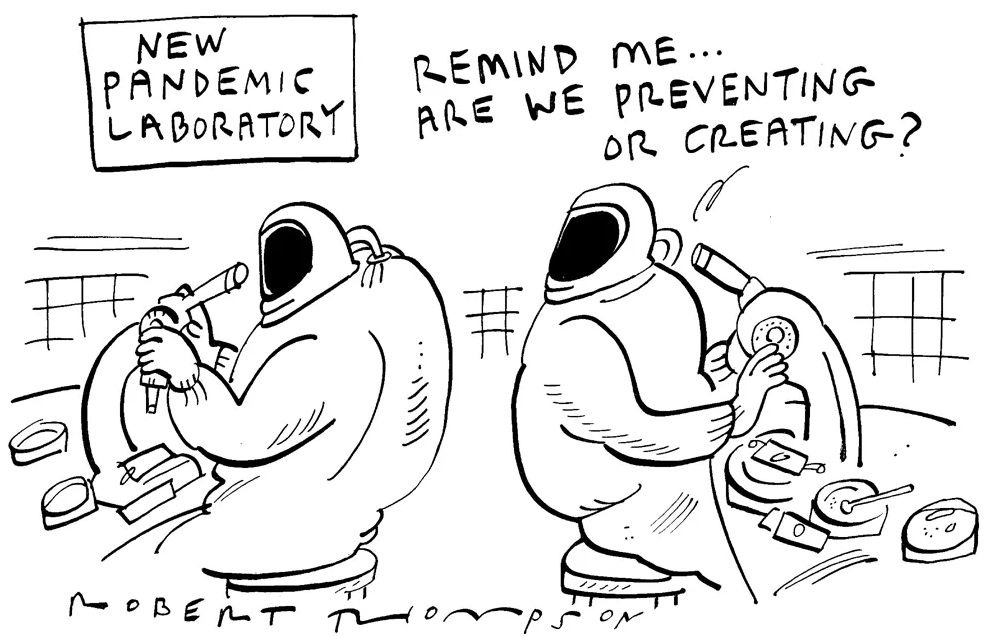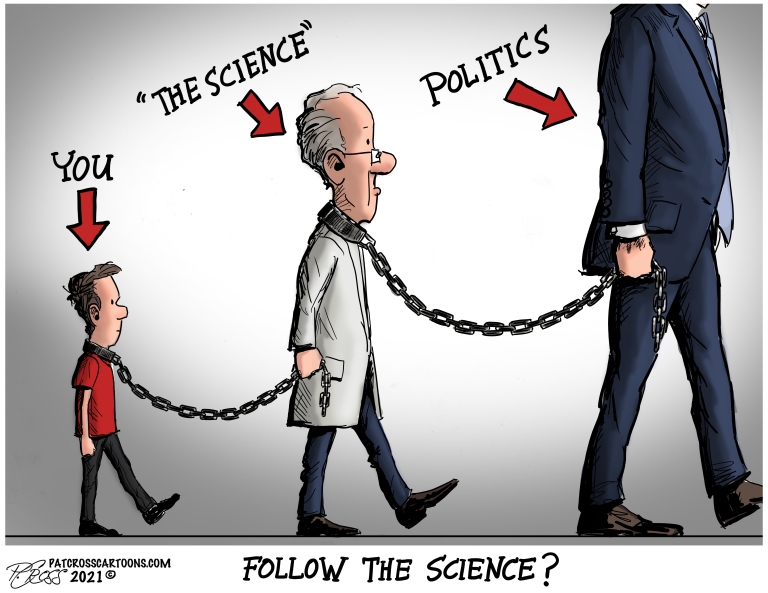In the Spectator this week Matt Ridley has an excellent piece looking at fraud in science and how the pandemic highlighted just how prevalent this is and the insidious ways it operates, bending conclusions to a preferred narrative and suppressing debate. Here’s an excerpt.
An alarming recent example is the case of the ‘pangolin papers’, four studies hurriedly published in February 2020 conveniently purporting to show that a handful of smuggled pangolins were infected with coronaviruses similar to SARS-CoV-2 in 2019. My co-author Dr. Alina Chan of the Broad Institute of MIT and Harvard soon spotted that all four relied on data that had already been published the previous year, and one paper had simply re-described four biological samples under new names.
It took the journal Nature six months to print a correction to that paper, in which the authors confessed to multiple errors. By then, the pangolins had done their job through the media to get the public thinking a natural source of the virus had been found – when it had not. (A couple of pangolins might have been infected somehow, but with a different virus.) The editors at Nature were either not bothered, or realised that the longer they stalled, the less attention there would be on how they had mismanaged the papers.
As this example shows, the real scandal in science is not the criminal frauds, of which there are always a small number, nor the data dredging and fire-hose publishing, but the gate-keeping, groupthink and bias that politicises some fields of science, turning it into the dogma known as ‘the science’. The pandemic provided a glimpse of just how far senior scientists will go to bend conclusions to a preferred narrative and suppress debate.
On the efficacy of masks, whether the Covid vaccines prevented transmission, the effectiveness of lockdowns and the accuracy of epidemiological models and other issues, the scientific establishment proved willing to suppress alternative views. The sceptics on these points were not necessarily all right, but they deserved to be heard.
“In retrospect, maybe it wasn’t so smart to hand the keys of public health over to mad-scientist virologists, hypochondriacal epidemiologists and megalomaniacal science bureaucrats,” tweeted Professor Jay Bhattacharya of Stanford Medical School recently. He was one of the authors of the Great Barrington Declaration, calling for focused protection rather than society-wide lockdowns. Regarding that declaration, “There needs to be a quick and devastating published take down of its premises,” wrote Francis Collins, head of the National Institutes of Health, to Anthony Fauci, head of the National Institute of Allergy and Infectious Diseases, in October 2020. “Is it under way?” It was.
The most shocking case concerns the ‘Proximal Origin’ paper that shut down the debate on the origin of COVID-19 for the best part of a year. Published by Nature Medicine in March 2020, it ruled out “any type of laboratory-based scenario”, deceiving me and many others. Emails and Slack messages released by a congressional subcommittee last month show how the five authors of the paper thought in private that several types of laboratory-based scenarios were indeed possible, even “friggin’ likely”.
They continued to think this secretly even as they drafted their paper, edited it in response to pressure from “higher ups” and journal editors to make what it said even more dogmatic, then published it and responded to media inquiries, while celebrating its influence. The lead author astonishingly told Congress two weeks ago that publishing one view while thinking the opposite is “simply the scientific process”. But the fact that the heads of their main funding agencies were part of the conversation, even suggesting edits, and were keen to (in Collins’s words) “put down this very destructive conspiracy” seemingly influenced what they wrote.
Last month 47 scientists wrote a letter to the editor of Nature Medicine requesting retraction of the Proximal Origin paper, and arguing that “the authors’ statements show that the paper was, and is, a product of scientific misconduct”. So far the editor, Joao Monteiro, has refused to consider retraction, arguing that it was just an opinion piece, despite the fact that it was peer-reviewed and hailed as a case-closing study.
Worth reading in full.













To join in with the discussion please make a donation to The Daily Sceptic.
Profanity and abuse will be removed and may lead to a permanent ban.
My hunch is that the primary driver for this decision by Black Rock, and the other banks, is to reduce their risk of shareholder lawsuits for their not properly exercising their legal fiduciary requirements.
Whatever the true reason (and no doubt it will be whatever is most financially beneficial for BR), the news is to be welcomed.
Indeed IMO all of these initiatives would potentially lead to corporate officers breaching their duty to shareholders.
CSR and DEI need to go the same way.
Hurrah! The Americans are coming! There does seem to be a bit of a sea change in motion, and not before time….
The Heartland Institute is an American conservative and libertarian non profit public policy think tank known for its rejection of….the scientific consensus on climate change
On December 17, 2024, Heartland officially launched what may be the first of several satellite affiliate offices in the U.K., Heartland UK/Europe,…..headed by Lois Perry.
Heartland is already having an effect on nut zero in Europe:
‘(Heartland President, James) Taylor….present(ed) information on March 13, 2024, at a special EU Parliament session on climate change, ESG, and proposed legislation that would require net zero EU carbon dioxide emissions by 2050.
Prior to the meeting, Vilimsky and Haider had informed Taylor that the net zero legislation had sufficient support to be approved, based on Hungary’s representatives indicating that country would support it.
Taylor had met some of Hungary’s representatives at a previous event in Vienna, and he renewed acquaintances just before the March 13 special session. During the session, Taylor explained why there is no climate crisis according to the best available data, and he warned of the economic, political, and geopolitical suicide that net zero would bring.
After the session, Taylor met informally with many of the Hungarian MEPs, continuing the conversation over dinner.
Less than two weeks later, the media reported stunning news. On March 25, in a striking defeat of the global climate establishment in the European Union, MEPs sponsoring the net zero legislation pulled it from consideration, after Hungarian MEPs announced they had changed their position and would vote against it.
This left the net zero proposal with insufficient support to pass.’
‘The Launch of Heartland UK/Europe is a signal of our commitment to bringing bold, evidence-based solutions to the forefront of European policy discussions’ said Perry.
‘By uniting key leaders and thinkers from both sides of the Atlantic, we are fostering a vital dialogue to counter ideologically driven overregulation and advance policies that empower individuals and communities.’
https://wattsupwiththat.com/2025/01/11/climate-change-weekly-530-are-net-zeros-days-numbered-heartland-comes-to-europe/
‘The resources that Heartland UK/Europe can provide, both intellectual and financial, are bound to be invaluable. In truth, this kind of American presence in Britain could neither be better timed nor more sorely needed. Evidence suggests that the UK is currently engaged in a mortifying contest with Justin Trudeau’s Canada to see who can claim the ultimate nagging rights as the most poorly governed, declining nation in the Anglosphere.
Nowhere is our bid for this title stronger than in the British state’s quixotic, utopian obsession with ‘achieving’ net zero emissions. Cheap, efficient, dependable energy is the lifeblood of an advanced industrial economy. Without it, capital is harder to come by, homes are more expensive to heat, and people’s overall quality of life goes down.
‘In the case of the net zero agenda, it is ordinary working people—those for whom the Labour Party claims to speak—who are suffering, and will continue to suffer, most of all. One saving grace is that this means their political loyalties will be up for grabs over the next five years. With the intellectual heft and scientific firepower of the Heartland Institute now behind him, Farage stands an even greater chance—not just of winning people over, but keeping them on-side with practical results if he ever makes it to No. 10.’
https://europeanconservative.com/articles/commentary/are-net-zeros-days-numbered/
It’s not very often I read one of your posts but this was a refreshing change. Time will tell.
Nine days until the Inauguration and counting.
Meta, Amazon and now Blackrock getting their ducks in a row.
Even the Commentariat is reporting it:
https://www.bbc.co.uk/news/articles/cgmy7xpw3pyo
“Meta and Amazon axe diversity initiatives joining US corporate rollback.”
“BlackRock, the world’s biggest asset manager, is abandoning the Net Zero Asset Managers initiative after coming under pressure from Republican politicians over its support for woke climate policies.”
Translation:
Blackrock have not been able to place the required funds in the respective bank accounts of their current detractors and until this anomaly is resolved they are backtacking slightly on their woke policies.
This has just delayed the net zero plans, until the next democrat government.
Alternate sub-head: Blackrock use Republican pressure as excuse to back off from supporting unworkable woke policies.
So Blackrock has sniffed the Trump wind …. and realised the Net Zero SCAM is collapsing.
Meanwhile, Two-Tier Keir is hiding in his No.10 bunker and is still allowing Red Ed to destroy the British economy and Rachel-from-Accounts to freeze 4000+ pensioners to death.
It is a sad reflection that the (apparently) biggest, brightest and best of people – I mean those who reach the highest highs of the business world and the public sector and NGOs etc – are such unprincipled cowards. So many questions remain about human nature and how societies run themselves. How can it be that we allow people like this to become the elite?
Obviously we need to redefine “biggest, brightest and best of people”. We also need to reduce the scale of everything.
PS I left out politicians in my list because there is no one in main stream politics that I can see who is anything but a robot following orders.